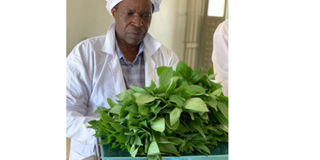Making the most of basil

Prof Bazeyo exports the basil to europe every week.
Basil, locally known as mujaaja is an aromatic herb from the mint family. In Uganda it is grown in the backyard gardens for local consumption especially for aromatic tea or chewed for medicinal purpose for cases of stomach ache.
Others use it in different culinary dishes as it provides an aroma through its flavour or spice in their dishes such as rice, and soups.
Orchids House Farm, a demonstration farm located in Kikangula village in Nakasongola District grows and exports sweet basil.
Planting
Prof William Bazeyo, proprietor Orchids Farm House and Deputy Vice Chancellor of Finance and Administration at Makerere University says, “We grow basil in greenhouses (controlled environment) as this enables it to get the optimal six to eight hours of sun. It needs a lot of water which we provide through the drip irrigation system to ensure that the soil is moist and well drained.”
The goal for introducing greenhouses was to simply reduce the labour force and improve the overall product.
Maturity
His son, Timothy Asingura, who is a director at Orchids Farm House adds that basil takes 15 to 21 days to germinate in a nursery bed and is then transplanted into a garden where it takes approximately 30 to 45 days to mature. In total one is looking at roughly 45-60 days to maturity.
Weeding
“Once planted, the soil may have initial seeds in the soil, which germinate on watering, but once weeded, the garden becomes weed free. Initially, we apply goat droppings (since they have a herd of goats) manure to the soil before planting and then this keeps the garden fertile. Rarely do we need fertilisers to be applied because these gardens are organic in nature,” Bazeyo continues.
The only fertilisers that could be used are only those recommended by the European Union for this crop.
“It is advisable to prune to prevent flowering, which helps keep the plant growing. Basil produces less aromatic and flavourful oils after it begins to flower.”
Harvest period
Bazeyo adds that, basil is harvested once it reaches six to eight inches and this is done weekly. Basil can be harvested for up to six months upon maturity.
Asingura who was exhibiting the farm’s different products during the recent farmer’s expo in Jinja recounts, “By attending different farming expos, we enable ourselves to engage in the different markets that are available to us. We have also invested in the international contacts by visiting some potential consumers of our product in Netherlands and German. But largely we have been marketing through a contact in Nairobi.”
Size of land
Orchids House Farm is currently growing 10 greenhouses of basil; each greenhouse is 8 metres by 30 metres roughly amounting to two acres of land. The company production site is 300 acres.
Challenges
“Basil is a delicate crop that needs a lot of care. And because of that we tend to hire skilled labour which is expensive,” says Bazeyo.
The most labourious stage includes harvesting, sorting and packaging. “It is recommended to harvest basil in the cool hours of the day especially early in the morning to keep the leaves fresh. Packaging is also done under a controlled environment and storage before export is in the cold room that we set up at the farm,” he says.
“The farm needs power to run the cold room but we have no electric power hence use a generator which makes costs high on fuel. The other challenge is that we need a lot of water to irrigate the plants,” explains Bazeyo.
Benefits
Basil is rich in vitamin A, vitamin K, vitamin C, magnesium, iron, potassium and calcium.
The herb contains an essential oil rich in estragol and it is this oil that is responsible for its healing properties.
Excess gas and belching, slow digestion and stomach nervousness (butterflies) caused by tension are some of the digestion ailments that can treated with basil.
Basil also invigorates the nervous and cardiovascular systems so if someone is fatigued, has low blood pressure or asthenia, it is recommended that they use it.
Besides the above, the herb helps breastfeeding mothers to produce more milk, eases menstrual cramping and reduces swelling in gums. Individuals with hernia and candidiasis would also find it useful.
Market
“Netherlands is our biggest export market. We export one tonne per week and we hope to double that early next year,” says Asingura.




